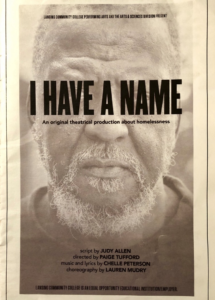 Without student inspiration, I wouldn’t be the educator I am today. I have always thought of students as my partners, with me at the helm guiding and teaching them. Five years ago – on a typical classroom day – a student comment changed not only that day, but the semester and the next few years. That comment? “Because I lived it.” This student shared in my Honors Comp II class (ENGL 132), that he had lived in homelessness. That stopped all of us. At the end of class, I told my students we had to do something, although I had no idea what that would be. Two weeks later, I had a plan, and over half my class volunteered. Somewhat nervous, we went to the Volunteers of America (VOA) homeless shelter to help homeless men and women write their stories. We went to the shelter once a week for 6 weeks, and my students met 1-on-1 with a homeless man or woman to write the story. The homeless clients trusted my students with their stories, and together, they listened, laughed, and cried. They cared. They learned. In the process, the stereotypes of oft-seen homeless on street corners holding signs, were crushed.
Without student inspiration, I wouldn’t be the educator I am today. I have always thought of students as my partners, with me at the helm guiding and teaching them. Five years ago – on a typical classroom day – a student comment changed not only that day, but the semester and the next few years. That comment? “Because I lived it.” This student shared in my Honors Comp II class (ENGL 132), that he had lived in homelessness. That stopped all of us. At the end of class, I told my students we had to do something, although I had no idea what that would be. Two weeks later, I had a plan, and over half my class volunteered. Somewhat nervous, we went to the Volunteers of America (VOA) homeless shelter to help homeless men and women write their stories. We went to the shelter once a week for 6 weeks, and my students met 1-on-1 with a homeless man or woman to write the story. The homeless clients trusted my students with their stories, and together, they listened, laughed, and cried. They cared. They learned. In the process, the stereotypes of oft-seen homeless on street corners holding signs, were crushed.
A couple years later, I was inspired again, this time from Melissa Kaplan, and a second project was born. I took a sabbatical to write a play called, I Have a Name, based on the stories of the homeless. I love the arts and wanted to include dance, music, poetry, photography, and theatre. Although I’m not a dancer, musician, poet, photographer or poet, I asked those who were. I found that everyone wanted to help; I just needed to ask. An unexpected benefit was that I worked across disciplines with talented people who gave time and expertise to make the play happen. I also asked the homeless who shared their stories to take part in the play. After packing Dart Auditorium for two shows, the homeless felt validated for the first time in years. One of them told me it was the first time she had been applauded; usually she was criticized.
Because my students learned so much, I wanted the College and Community to learn, too. I wanted people to see that homelessness typically isn’t a choice; it’s not a lazy person who won’t get a job. They are young and old, black and white, male and female. They have a name, and they need help. Alongside the play, attendees could help by giving. We asked for cold weather gear for local shelters like hats, gloves, and socks, and received hundreds of items. We asked for LCC Cares Fund donations and received over $2000.
I was humbled by the community generosity and the help from colleagues and the homeless. I learned that it’s not only a good lesson plan that can make a difference; it’s listening to students and changing the plans that can change lives forever.
– Judy Allen, Integrated English Professor at Lansing Community College